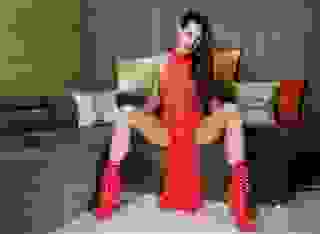Note: You can change font size, font face, and turn on dark mode by clicking the "A" icon tab in the Story Info Box.
You can temporarily switch back to a Classic Literotica® experience during our ongoing public Beta testing. Please consider leaving feedback on issues you experience or suggest improvements.
Click hereThe last row on the board was for questions. I put a sticky note asking why Judy's doors were unlocked in the opportunity column. Another sticky note in that column said she probably knew her attacker. In the Means column I put a sticky note with "weapon and caliber". I put another in the Motive column with "computer forensics results".
My shift was over by then and I wasn't going to find out much else until the next day, so I locked up and called it a day.
When a detective is working on a case, he doesn't usually leave it when he leaves his office. Oh, there are the ones where some gang-banger runs into a couple rival gang members and ends up dead. Most of us don't have much sympathy for the victim in those crimes, because we usually find out the victim was also the perpetrator of several other crimes. Him being dead just means we have fewer crimes to solve in the future.
We'll still work hard to solve the case because if we don't find the killer, he'll just kill again, and the next time it might be a young kid or an innocent bystander. Those cases are as important as any other homicide, but they're easy to leave tucked away in a file folder and out of our minds.
Murders like Judy's aren't. Nothing I'd learned so far indicated Judy was anything besides a very intelligent woman who was a little quiet but always nice to her neighbors. It sort of eats away at you wondering why some asshole decided she needed to die and not being able to come up with an answer. I was trying to think of that answer when I drifted off to sleep.
The next morning I checked with Barbara and Jason to see if they had any answers.
Barbara grinned.
"Well, we know the bullet was fired from a nine millimeter pistol, and that pistol had polygonal rifling. That means your murder weapon was probably a Glock or a Kahr. There are a couple other manufacturers who use that type of rifling, but their weapons are not as common because they're pretty pricey."
I asked if they'd identified anything else about the murder weapon. Jason said that was what he'd been working on and that he was confused.
"At the outer edges of the blood pool, near the victim's head, we found gun powder, unburned gunpowder, and there was quite a bit. That's pretty unusual. Even in a pistol with a short barrel, almost all of the gun powder burns in the case before it can be blown out behind the bullet. Any that does come out is usually just a gas and burns in the air close to the muzzle. That's the muzzle flash you see at night. I don't have an explanation for that one yet.
"There were no powder burns on the clothing?"
"Nope. Just the gun powder on the floor."
"The coroner said the bullet was traveling at a pretty low velocity because it didn't exit the body. He thought it might have been fired from a significant distance. Any thoughts about that?"
"Well, it wasn't fired from a distance. The bullet wasn't deformed much at all, so the velocity was pretty low, but it was probably fired between three and five feet from the victim. Any closer than three feet and we'd have found powder residue on her clothes. Further than five, we might have found something on the table that was about five feet from where she fell. The shooter had to be that close. There's no way un-burned gun powder would travel more than a few feet, much less as far as would be necessary to drop the velocity to the point the bullet wouldn't be deformed by impacting the spine.
"As for the low velocity, I don't know. I suppose the shooter could load a cartridge with a very small charge of powder. That would keep the velocity and sound down, but I've read it could also blow up the firearm if the shooter didn't know how to do it. A smaller powder charge should also completely burn in the case, but you need to check with an expert on both those ideas. If you figure it out, let me know.
"There is one other thing I can't explain. Under the woman's body we found a small, ragged piece of paper about half a millimeter thick. It was just a small piece, about the size of a pea and the edges were ragged and charred. Unless I can figure out some other explanation, I'm going to say it was on the floor before the victim was shot and she just covered it up when she fell. I don't have any idea what it might have been, but I can't see how it has anything to do with the murder."
I asked if they'd had any luck with the fingerprints they'd collected. Barbara had done those and said they'd collected prints from all over the house including the front and read door knobs, and that there were two different sets. One set she'd matched to the prints the coroner had taken from Judy. The other was completely different. She'd sent them both to the FBI to see if they had a match in their database. The inquiry had come back negative on Judy's, and the second were a match for the prints the police had taken from Melissa when she got her carry permit.
Barbara frowned then.
"You know, there's something a little odd about where we found Melissa's prints. We found them all over the house, kitchen, bathroom, even in the bedroom on the headboard. That's kind of unusual unless someone robbed the house either before or after the murder. We didn't find any thing that looked like robbery. Her jewelry chest was sitting on the dresser and it was full. There was five hundred in cash in the desk where her computers were, and her purse still had credit cards and more cash. She'd evidently let Melissa have the run of her house, and if it was me, I'd have to trust a person a lot to let them do that."
It looked like Melissa wasn't telling me all there was to tell about her relationship with Judy. It was time to talk with her again. I called her cell number and arranged to meet her at her house the next afternoon at three.
Beverly, one of the clerks at the county records office, did a fantastic job of getting me all the records for Judy and Melissa. Scans of everything were in my inbox when I checked my email that afternoon. There was a little information I didn't already know.
Judy Green was born at Mercy hospital in the city to Mary and Joe Green. I'd worked with Beverly before, and I'd put the reason for my inquiry on the request form. Beverly had taken it upon herself to also give me the death certificates for Mary and Joe - five years before for Joe and three for Mary -- and had found no other births recorded with Mary as mother or Joe as father. She'd also found the deed to Judy's house. Apparently Judy was well paid for her work. There was no mortgage lender stated on the deed. In her note to me, Beverly said she hadn't found any marriage or divorce records, and no birth records listing Judy as the mother.
Melissa's birth certificate was included in the files Beverly sent, as was her marriage license and divorce decree. The divorce had been filed by Melissa on grounds of adultery. Bryce, her husband, hadn't contested it, and the property settlement was that Melissa got the house and three fourths of their savings account while Bryce got the other fourth of the savings account.
Just as more confirmation about Judy's next of kin, I did a search of the newspaper files for the obituaries for both Mary and Joe Green. There was no mention of any siblings in either, and Judy Green was listed as the next of kin for both.
I updated my board with the new information then. In the row for questions, I put a sticky note with "Melissa/Judy relationship" in the Motive column. In the Means column, I put a sticky note with the question of how a low velocity nine millimeter round could be made, and another for what would cause unburned gunpowder to be blown out of a gun muzzle. The third sticky note in the Means column asked where the spent cartridge case had gone.
When I finished, I backed away from the white board and looked at the rows and columns. I didn't like what I was seeing.
The person of most interest was Melissa. She had the opportunity because she was in Judy's house. It wasn't difficult to theorize she'd gotten there earlier than she'd said, shot Judy in the chest, and then waited a while before calling 911. She also could have had the means if she still had the weapon she'd used to qualify for a carry permit, and to qualify for a permit, she'd have to be a pretty fair shot. The motive was also easy to speculate. I could think of only one reason Melissa would have been in Judy's bedroom and would have left her prints on the headboard. I've investigated the results of a lovers' quarrel before.
My gut told me Melissa didn't do it, but my gut has been wrong before when dealing with women perpetrators. I understand the effect a pretty woman can have on my thinking, and I've learned to ignore the feelings, but they're still there. They were there that night up until the time I fell asleep.
Melissa lived in a really nice house in a really nice suburb. She opened her door after my second knock and invited me inside. She was dressed in what I supposed was her work clothes -- a gray business pant suit with a white, frilly blouse.
I'd decided on the way over to tell her she was my prime suspect and to tell her why. I was pretty sure Melissa wasn't telling me everything about her relationship with Judy, and there were probably a few other things she wasn't telling me as well. What I wanted to do was shock her into either confessing or giving me the information she'd been withholding.
I turned down Melissa's offer of a cup of coffee, and then began.
"Melissa, there's no easy way to say this. From what I know so far, you're probably the person who killed Judy. Unless you can give me some answers that might clear up the questions I have, I'm going to have to arrest you."
Melissa stared at me with her mouth open for a full minute before saying anything, and when she finally did speak, it was obvious she was angry.
"You think I killed Judy? How could you think that? Judy was my best friend."
"That's what the evidence I have so far says."
"What evidence?"
"Well, you had the opportunity. You were in her house."
"Yes, and I told you why."
"Can you prove you weren't there earlier? The coroner says Judy died sometime around one thirty. That's only twenty minutes before your 911 call. You could have shot Judy and then just waited before making the call. None of Judy's neighbors saw when you got to Judy's house, so I need some proof that you weren't there earlier."
"It takes me half an hour to get from my house to Judy's unless the traffic is bad. Then it takes me up to forty five minutes. I left my house at one fifteen and the traffic was about normal. That's why I got there ten minutes early. I don't really have any way to prove that though. Is that why you think I did it?"
"It's part of the reason, but there is at least one more. You also might have had the means. I found out you once had a carry permit. That means you have or had a weapon. Do you still have it?"
"Yes, but I haven't shot it since I qualified for the permit. Bryce, my ex, was really into guns and self-defense. He used to hang out at this one gun shop all the time and talk about which guns were best for self-defense, and he read all kinds of gun magazines. He said he did a lot of research before he bought me the pistol, and said it was small enough to fit in my purse but it would stop a man as long as I shot him at least three times. I couldn't see myself shooting anybody even once, but he said I should know how.
"Once he'd bought us each a pistol, he signed us up for carry permit classes. I got mine, but I thought it was a little silly. Nothing had ever happened to me that made me think I needed to carry a pistol."
"Can I see the pistol?"
Melissa sighed.
"Do you have to? It's in my bedroom closet and my bedroom's a mess. I was in a hurry this morning and didn't make the bed or pick up my PJ's."
I shrugged.
"I can get a warrant and look for it myself."
"No. You don't need a warrant. Just don't look around too much. I'm not really a slob like it looks like I am."
The plastic case Melissa handed me said "GLOCK" on the side, and the GLOCK 26 inside looked new. I released the magazine and racked the slide to make sure there wasn't a round in the chamber. The mag was full but the chamber was empty. I sniffed the barrel. All I smelled was a faint trace of gun oil.
"When did you last fire this pistol?"
"About eleven years ago, when I qualified for my permit. After that I did carry it for a while, but it made my purse really heavy. As soon as my ex moved out, I put it in the box and put it in my closet. It's been in the same place ever since, so I couldn't have used it to kill Judy."
"No, it's not that simple, Melissa. The pistol is clean, but I don't know if it was cleaned eleven years ago or yesterday. I'll have to take your pistol to the lab and have them compare a bullet fired from it to the one the coroner found in Judy. I'll have to take you in as well."
There were tears in Melissa's eyes, but she didn't start crying.
"You still think I did it?"
"I'm not positive, but it looks like you had the time and a way."
"Do you have to put me in handcuffs?"
"Yes. It's standard procedure."
"Is there some way you can do it that my neighbors can't see? I don't want them thinking I'm a criminal."
I cuffed Melissa in front and her purse and a light sweater pretty much hid the cuffs. I drove to the station, put Melissa in an interrogation room, and then took the Glock to the lab and gave it to Jason. It took him only five minutes to fire two rounds from the magazine into their bullet capture tank and then mount one and the one from Judy on the comparison microscope. He turned the knobs on the microscope for a few seconds, then looked up at me.
"You've got your murder weapon. The bullets are the same, and the rifling marks are identical."
I asked if he could tell how long it had been since the gun was cleaned.
"No, not with any accuracy. The internal mechanism was a little gunky and I had to rack the slide a couple of times to get the round to chamber, but that could just be because the shooter only cleaned the bore. I can tell you the cartridges and the bullet that killed your victim are pretty old. The copper jackets on both bullets and the cartridges in the mag are oxidized quite a bit, like they've been sitting around for years."
"Would age cause a round to have low velocity or to not burn all the gunpowder?"
"Nope. As long as it's stored in a reasonably dry environment, ammunition has a long shelf life. You can still buy military surplus ammunition from World War Two even though it's seventy plus years old. Some of it has degraded a little as far as consistent velocity, but other than that it works just fine. These rounds fired and cycled the action like they should have even though the slide was a little sticky."
There was still the question of bullet velocity and unburned gunpowder.
"Anything look like that bullet had been removed from the case and then put back in after taking out some of the gunpowder?"
Jason looked back in the microscope, turned the dials again, then looked back up.
"The bullet from your victim has some different scratches around the base, but those could be just from manufacturing. The nose of that bullet is a little different too, but it might have been deformed that way when it hit her spine, so it's hard to tell."
"So there's still no explanation for the low velocity or unburned gunpowder?"
"I haven't found one yet. I know someone who might know though. I just haven't had a chance to call him yet because we've been examining some hairs we found in the bathroom and on the bed. Some are blonde and they match those from your victim. The others are red. A few of those in the bed were blonde and red pubic hairs. That help you any?"
"Yes, it does. I think I have my shooter in an interrogation room right now, but I still need an answer for the other things."
Jason wrote a name and phone number on a note pad and then handed it to me.
"Call this guy. He's a local competition pistol shooter who helps us out with gun questions once in a while. If it can happen, he'll know how it could. Uh...your shooter wouldn't be Melissa Grady, would it?"
"That's what it's looking like, why?"
"I think our computer guy might have found the motive. He didn't find anything about any forensic work she did like you thought there might be. Evidently she'd just started doing that. There was a description of what she could do that she'd emailed to a few prospective clients, but no record of any work. The rest of the business records were just accounting stuff and some records of work on web sites and on-line training she had done. All her clients were happy and paid her well. I should make the same rate per hour that she charged.
"What he did find might relate to your case. She had one file named, 'In Case I Die', and it had instructions for who was to do what if she did. She listed the name of her lawyer along with a copy of the will she gave him. She left everything to Melissa Grady. She also named Melissa as her executor. There were scans of the receipts for a burial plot and burial service she'd already purchased."
Jason was right. I now had a motive to go with the opportunity and the means. That would be all the DA needed to arraign Melissa for first degree murder. I went back to the interrogation room to formally arrest Melissa. Even though I still had some questions, the evidence I already had was all I really needed to hold her. She smiled when I walked into the room, but frowned when she saw my face.
"What's wrong. You said I could go once you checked my pistol."
"No, I said you could go if your pistol wasn't the one that killed Judy. As it turns out, the bullets from your pistol are identical to the one that killed her. I also found out you're the sole heir of Judy's estate and that gives you a pretty good motive. You're under arrest for first degree murder, but I still have some questions. Anything you tell me from now on will be used by the DA in your trial, so you can call a lawyer first if you want."
Melissa's face turned angry again.
"I don't need a lawyer because I didn't kill Judy, and she never said anything about leaving me anything. Why would I do something like that even if she had? She was the best friend I've ever had."
"Well, your relationship with Judy is one of my unanswered questions. The Crime Lab Techs found your fingerprints on the headboard of Judy's bed and they found hairs in her bed too. Some of the hairs in the bed were pubic hairs, some blonde and some red. Unless you dye your hair that color, I think the red ones are probably yours. I can prove that with a DNA analysis if I need to.
"I think maybe you were more than just friends, and that something caused you to have a falling out. You went to her house, killed her because of that falling out, and then waited half an hour or so before calling 911. That's what happened, isn't it? If you admit to it, the DA might let you off with a plea bargain to something less than first degree murder."
Melissa stared at me for a couple of minutes, and then sighed.
"I can't admit to killing her because I didn't, but we were more than just friends. We were lovers. I didn't tell you before because I didn't want it in the papers and on the news. I couldn't have killed Judy because I loved her. We've been together longer than the three years I told you. We've been seeing each other since before my divorce."
"I know about your divorce, but the records say you filed because your husband committed adultery. Is that the real reason for the divorce, that you were sleeping with Judy?"
"Yes and no. I divorced Bryce because he was sleeping with his secretary. I know, it seems hypocritical, divorcing him for sleeping with another woman when I was doing the same thing, but I had to get out of the marriage. His family is Catholic and Bryce didn't believe in divorce, at least at the time. He'd have stayed married to me as long as he could have her whenever he wanted her. She seemed to be happy with that too.








